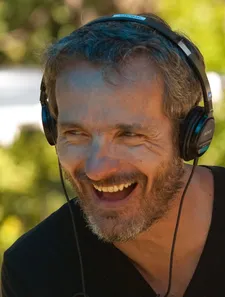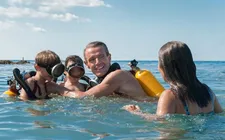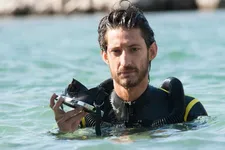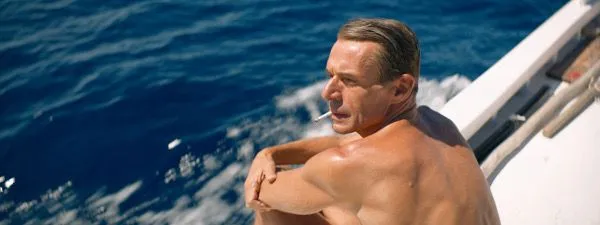French director Jerôme Salle thrives on a sense of adventure, never more so than when making The Odyssey, his epic take on the life of naval officer Jacques Cousteau whose underwater exploits made him a celebrated name all over the world through his films and TV series. Salle concentrates on the relationship between Cousteau and his son Philippe as well as the diver’s megalomaniac nature and grandiose schemes which wrecked his family life. During an interview at the Rendezvous with French Cinema in Paris earlier this year Salle reveals surprising parallels between Cousteau’s life and his travails as a director.
Richard Mowe: Was it one of the most challenging films that you have done?
Jerôme Salle: It was one of the most challenging for many reasons. First it was really difficult to make the movie happen at all. The shooting was challenging but less so than financing the film.
RM: Why was that?
JS: It is always difficult to get the money to finance a movie. This one was more difficult because it was quite expensive for sure, but also may be because the shoot was quite risky - we were shooting underwater and on the water and people got cold feet because of that. We shot all over the world in Croatia, South Africa, the Bahamas and Antarctic.
RM: How did you as a filmmaker cope with going in to the murky depths under the sea?
JS: It is a totally different world. You have to learn your job all over again from a technical and artistic point of view. That was the main hurdle, but it was also very exciting.
 |
| Director Jerome Salle Photo: Mélanie Cleary |
RM: Did you get to know Jacques Cousteau from making the film or did you have a good idea of who he was before you started?
JS: I had a good idea, or at least my idea, which is important before you write the story. I did not change my mind about him while shooting the film, but it took me years to be able to understand who exactly he was. He was quite a complex character and quite secretive. It is a bit of a paradox because he was showing his face all over the world but he was only showing what he wanted to show and he was hiding a lot of things. That is why it took me so long to understand this man.
I liked his sense of adventure. He was a director and he was egocentric like every director has to be. He has to deal with his family as I have had to deal with my family and the long absences of shooting all over the world. Perhaps I am not such a great father because of my job and he had the same issue. When we were shooting the film, we had struggles with the budget and had to deal with the elements - it felt like the same kind of situation Cousteau had to deal with also over the years. There were so many parallels. And there were so many aspects that you could not plan advance and in a way that was inspiring - especially on a film like this.
RM And was that the same for the actor Lambert Wilson, who plays him?
JS: It took him less time because, of course, he had less time but he also had the script. I was able to tell him who we should meet and what kind of books he should read about him.
RM: There must have been a lot of material to watch, but perhaps not all that revealing about him as a person?
JS: Exactly - that was certainly the case. So reading about him was not enough. I had to meet many people who knew him - his family, of course, but many of the people who had worked with him as well as the crew of the vessel the Calypso.
 |
| Salle says Audrey Tautou 'understood right away who Simone was' Photo: Unifrance |
RM: Why was now a good time to talk about him - was there a particular reason?
JS: No not really - the way a movie starts for me is always that you hear about a subject and it hits you and you think, ‘Yes, I could do a movie about that’. Talking about Cousteau was also a way of talking about the 20th century. He was a typical man from our times who was able to do some great things and to also do some very bad stuff too. That made him interesting from a dramatic point of view. It was also fascinating to reveal a very complex character.
RM: Some of the environmental and ecological issues are perhaps more pertinent today than they were when Cousteau started out?
JS: It was not really my goal to talk about such issues at the beginning but shooting this film I became more and more sensitive about the environmental issues. For example, there was the fact that when we were shooting in the south of France and around the Mediterranean certain fish varieties did not exist any more and we had to recreate the fish by means of CGI [special effects]. There were no big sharks in the Red Sea any more and we had to find them elsewhere. So we had all these problems which illustrates how much damage is being done by pollution and chemicals.
It is strange because at the beginning Cousteau had no interest in ecology. All the people who were around at this period, had no concerns and there was no limit on evolution but now we know there is a limit.
RM: Describe your casting process - did you have particular names in mind?
JS: I try not to have any actors in mind, partly because you might be disappointed with a 'no' - it happens. Obviously I started with Cousteau - and in previous versions of the script I started earlier in Cousteau’s life and I was looking for someone around 40 to 45 years old. I could not find anyone that I was happy with. And then, for other reasons, I decided to focus on the relationship between father and son and I deleted the first part of the script. That meant I was looking for an actor around 50 years old and Lambert [Wilson] was perfect for that role. For Pierre Niney, I met him before Lambert so he was attached a long time before. Audrey Tautou was quite easy because she is Simone [Cousteau's wife]. She read the script and immediately said, 'Yes' - she understood right away who she was. Lambert has the physical presence but he did have to go on quite a tough diet to get the lean physique. Pierre was the reverse - he had to bulk up by going to the gym.
RM: This was your fifth feature - do you like making films on an international scale?
JS: The thriller Anthony Zimmer was my first [it was remade in the States as The Tourist]. It may seem that I like doing films on a large scale but that is just the way it has happened. I might quite enjoy doing a film taking place in just one room. People in France now seem to expect me to make ‘big’ movies. There is a kind of pressure to go on making films on this kind of scale but personally I would enjoy making different kinds of films. My films do have an international aspect to them - there was also Zulu, with Orlando Bloom, which was shot in Africa and in English. I love talking about the world - and may be it would be tricky to make a film in Paris where I live.
RM: What characterises French cinema for you?
 |
| Pierre Niney as Cousteau's son Philippe. 'He had to go bulk up in the gym' Photo: Unifrance |
JS: I love its diversity - we have to keep on in this vein. We have such a range of subjects even if today there seem to be a lot of comedies. But we also have good dramas and contemporary themes. French cinema, in a way, is taking more risks than Hollywood. We make films on smaller budgets so the money pressure is less. As we take more risks some times we founder, and some times we do very well. France also supports other film industries and people like David Lynch, Woody Allen, Paul Verhoeven, and Ken Loach would not have been able to make the kinds of films they have done without French money.
RM: Have you worked out what you’re doing next?
JS: I always have many projects in the pipeline but as yet I don’t know which one will be next. It took some time to come down from Cousteau. The mix is of my own projects and projects that are brought to me - and I would quite like one of the latter at this point because I am fed up with myself as a writer. I don’t want to be locked in to my work as a writer and, as a director, it is exciting to work with someone different for inspiration and to have someone to spark off. Like many of us in this profession I am always frightened that it will all be over and someone will come along say, ‘Stop it - what you’re doing is bullshit’. So far it has not happened!
RM: Was your route in to the business a traditional one of going to film school?
JS: No not at all. I left school at 16 because I wanted to travel. And I did that for a few years and subsequently became a press photographer. I then became an art director in different countries including a spell in the UK in London and in Germany. My dream had always been to be a film director. I was not ready when I was younger and, in any case, I did not have the courage. When I was 30, I thought if I do not do it now I never will - and I started off by writing short films. I always kept my job as an art director because by that time I was married and had children to support. My wife helped me out. Some how we managed - you must know the famous singer Jacques Brel who said that you get by on five per cent talent and 95 per cent hard work and I believe that, especially in our job.
The Odyssey will play at Glasgow Film Festival on February 22 and 23. Visit the official site for tickets. It will have its US premiere as the closing night film of New York's Rendez-vous with French Cinema, screening on March 11 (including a Q&A with the director) and 12, details from the official site






















